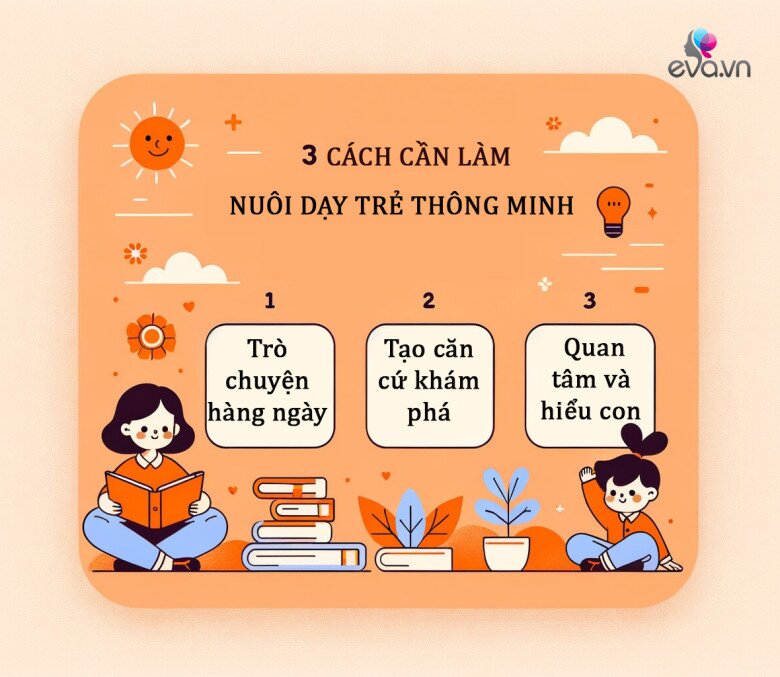During the golden stage of a child’s brain development, the most essential thing is high-quality companionship from parents and appropriate environmental stimulation.
There are three simple but important things that parents can do immediately to help their child’s intellectual development.


Turn conversations into “brain food”
From birth, a parent’s voice and expressions are a child’s best learning tools. Parents should talk to their children using expressive voices and exaggerated facial expressions, for example, saying, “Oh, you’re having so much fun, aren’t you?” with a smile and a loving gaze.
This is called the interaction cycle and is the foundation for children to learn language and understand social rules. When children see their parents smiling, talking, and reacting to them, they begin to understand the connection between actions and emotions.

As the child gets a little older, point to pictures and ask, “Where’s the puppy? Woof woof woof!” or describe actions during bath time, “We’re washing our hands, scrubbing them, so clean!” These daily activities become golden opportunities for children to absorb language and build their vocabulary.
The key is to react and follow through. If the child stares at a light, the mother can say, “Wow, look at that bright light!” If the child reaches for a rattle, describe it: “Sweetie, do you want the rattle? It makes a rattling sound.” These statements help children connect words with actions and sounds, increasing their interest.
Parents should take advantage of free time during mealtimes, diaper changes, and walks to engage in back-and-forth communication. Just 10-15 minutes of genuine interaction each day will be much more effective than spending long periods cramming knowledge.

Create a fun and safe space for exploration
Infants learn about the world through play, and intellectual development is inseparable from the use of their hands, feet, and bodies. Parents don’t need to fill their homes with expensive toys. A safe, free, and slightly challenging environment is more important.
Spread a large blanket on the floor and clear away any dangerous objects—this will be the best play area. Encourage tummy time by letting the baby lie on their stomach, using small toys to attract them to lift and turn their head, exercising their neck and back muscles, which are the foundation for future gross motor skill development.
Don’t hold the baby all the time. You can use cushions and cardboard boxes to build a small tunnel and encourage them to crawl through it.

Place some toy pots and pans, and fabrics made from different materials (scarves, towels) in a low drawer and let the baby explore, touch, and feel the different textures. This is the best way to enlighten their senses and enhance their perception.
So, how do you develop fine motor skills? Paper tearing (using old magazines) and stuffing cotton into mineral water bottles are great DIY methods to improve finger dexterity and hand-eye coordination.
The key is to transform the home into a place where children are allowed to explore freely and occasionally “make a mess.” Parents should quietly observe from a safe distance and guide their children to play correctly.

Be an understanding and empathetic parent
When a child cries, it can be due to various reasons such as hunger, discomfort, needing their parent, or boredom. Responding to these signals timely and appropriately is called “responsive caregiving.”
This not only meets the child’s needs but also conveys the message, “Your emotions are important, and the world is a safe and reliable place.” This sense of security is the psychological foundation for children to boldly explore and focus on learning.
For example, if the child reaches for a cup on the table, instead of saying “no,” the mother can pick it up and bring it closer for the child to observe (ensuring safety) and say, “This is Mommy’s cup. It’s hard. Do you want to touch it?” Understand and respect the child’s curiosity, and then gently set boundaries.
Observation is the precursor to reaction. Parents should be aware of what sounds the child is sensitive to, what types of toys they prefer, and what actions can soothe them when they’re upset. Paying attention to these small details will help parents understand and interact with their children more effectively.

The process of intellectual development is not isolated but closely linked to emotional security. When children feel fully understood and safe, they will have more energy to explore and learn.
Raising a child, especially in the first three years of life, can be a challenging task. However, to promote intellectual development, parents sometimes need to become “super parents.”
Start incorporating these tips into your daily life, turn them into habits, and over time, you will lay the warmest and strongest foundation for your child’s intelligent brain.
































